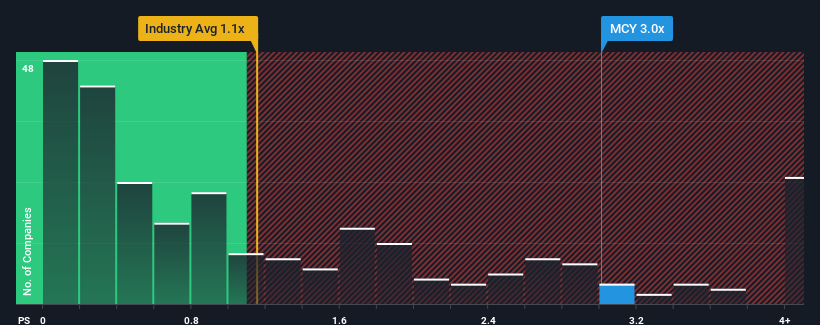- New Zealand
- /
- Electric Utilities
- /
- NZSE:MCY
Subdued Growth No Barrier To Mercury NZ Limited's (NZSE:MCY) Price

Mercury NZ Limited's (NZSE:MCY) price-to-sales (or "P/S") ratio of 3x may not look like an appealing investment opportunity when you consider close to half the companies in the Electric Utilities industry in New Zealand have P/S ratios below 2x. However, the P/S might be high for a reason and it requires further investigation to determine if it's justified.
View our latest analysis for Mercury NZ

What Does Mercury NZ's P/S Mean For Shareholders?
Recent times have been advantageous for Mercury NZ as its revenues have been rising faster than most other companies. It seems the market expects this form will continue into the future, hence the elevated P/S ratio. If not, then existing shareholders might be a little nervous about the viability of the share price.
Want the full picture on analyst estimates for the company? Then our free report on Mercury NZ will help you uncover what's on the horizon.How Is Mercury NZ's Revenue Growth Trending?
In order to justify its P/S ratio, Mercury NZ would need to produce impressive growth in excess of the industry.
If we review the last year of revenue growth, the company posted a terrific increase of 16%. The latest three year period has also seen an excellent 70% overall rise in revenue, aided by its short-term performance. Accordingly, shareholders would have definitely welcomed those medium-term rates of revenue growth.
Shifting to the future, estimates from the four analysts covering the company suggest revenue growth is heading into negative territory, declining 2.5% per year over the next three years. Meanwhile, the broader industry is forecast to expand by 1.2% per annum, which paints a poor picture.
With this in mind, we find it intriguing that Mercury NZ's P/S is closely matching its industry peers. Apparently many investors in the company reject the analyst cohort's pessimism and aren't willing to let go of their stock at any price. There's a very good chance these shareholders are setting themselves up for future disappointment if the P/S falls to levels more in line with the negative growth outlook.
The Bottom Line On Mercury NZ's P/S
Typically, we'd caution against reading too much into price-to-sales ratios when settling on investment decisions, though it can reveal plenty about what other market participants think about the company.
We've established that Mercury NZ currently trades on a much higher than expected P/S for a company whose revenues are forecast to decline. Right now we aren't comfortable with the high P/S as the predicted future revenue decline likely to impact the positive sentiment that's propping up the P/S. At these price levels, investors should remain cautious, particularly if things don't improve.
You need to take note of risks, for example - Mercury NZ has 4 warning signs (and 1 which shouldn't be ignored) we think you should know about.
It's important to make sure you look for a great company, not just the first idea you come across. So if growing profitability aligns with your idea of a great company, take a peek at this free list of interesting companies with strong recent earnings growth (and a low P/E).
New: Manage All Your Stock Portfolios in One Place
We've created the ultimate portfolio companion for stock investors, and it's free.
• Connect an unlimited number of Portfolios and see your total in one currency
• Be alerted to new Warning Signs or Risks via email or mobile
• Track the Fair Value of your stocks
Have feedback on this article? Concerned about the content? Get in touch with us directly. Alternatively, email editorial-team (at) simplywallst.com.
This article by Simply Wall St is general in nature. We provide commentary based on historical data and analyst forecasts only using an unbiased methodology and our articles are not intended to be financial advice. It does not constitute a recommendation to buy or sell any stock, and does not take account of your objectives, or your financial situation. We aim to bring you long-term focused analysis driven by fundamental data. Note that our analysis may not factor in the latest price-sensitive company announcements or qualitative material. Simply Wall St has no position in any stocks mentioned.
About NZSE:MCY
Mercury NZ
Engages in the production, trading, and sale of electricity and related activities in New Zealand.
Slightly overvalued with limited growth.
Similar Companies
Market Insights
Community Narratives


